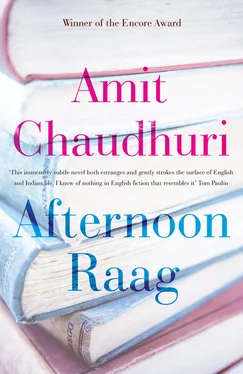Shehnaz lived on the first floor of her building, in a room even tinier and more modern than mine. Next to her bed, which during the day served as a sofa, were several shelves with books on history and politics, a few novels, picture-postcards, and photographs of her family. The books had significant titles on their spines, narrating stories of crises in faraway countries, conjuring the exciting imaginary worlds that graduates inhabit. Yet the global concerns expressed in the titles fitted in quite unremarkably with the marginal life in Shehnaz’s room, with its teacups and electric kettle, and with the green, semi-pastoral life in Oxford. Opposite the bed there was a study-table, upon which stood a lamp whose angles were always crooked; beneath it, books lay open upon their backs, with lines marked out in pink and yellow, and next to that, there was a neat pencil box with pens of different colours. The table faced the wall-to-wall glass partition that illuminated every part of the small room on sunny days, and provided a seemingly unlimited view of a wide field receding slowly towards a border of trees. When one sat inside the room and looked out, one had a sense of being surrounded on all sides by space, silence, and greenery. Students in coloured jerseys sometimes played football in that field, radiating in various directions, as they did on that afternoon when Shehnaz lay on her bed and I unbuttoned her shirt. On such brilliant days, unusual birds could be seen running on the field, especially when it was empty and hot and shadowless, and full of its own presence. Along its sides, beautiful English flowers bloomed in clusters, and if one walked there, one encountered small, timid creatures, shy hedgehogs and nervous, preoccupied squirrels. Whenever I looked up that afternoon, I would become aware of the frame of the window, which created an illusory and transparent separation between ourselves and the day outside. It was impossible not to be conscious of nature and sky, not to be surprised at how incidental, like stage-sets, these rooms were, and how specific the human rehearsals within them, of love or social intercourse. Our privacy, carefully constructed in the room, lost its meaning against the background of the glass that continually let in the solitude of that landscape.
The walls in Mandira’s room had photographs stuck to them with Blu-tack, and posters of Great Britain, showing the interiors of churches and cathedrals, and pieces of paper that had verses typed upon them. Greeting cards from friends all over the world were arranged upon the mantelpiece, and on the wall opposite, by the window, there was a board to which was pinned an amazing array of scribbled messages, lecture-lists, and printed or handwritten invitations from acquaintances, tutors, college societies, and the students’ union. There seemed to be a great crowd of people scattered through the colleges of Oxford with whom Mandira was on first-name terms; later, when her life became more solitary, more nocturnal, and was spent more upon the anxieties we created for ourselves, those letters still stayed pinned to the board, no longer representing her other life outside her room, but a forgetfulness, the dates missed, the events long over, but the lecture-lists and invitation cards remaining upon the board as a beguiling and innocent surface.
In Oxford, the modes of social existence are few but tangible. But the tangibleness of this existence — conversing at parties, studying at libraries, going to lectures — is at the same time dreamlike. Sometimes the occasions seem like images that one has projected from within for one’s own entertainment, until they fade, as they must after a certain hour at night. Night brings darkness, the emptying of the images that made up the day, so that, in the solitary moment before falling asleep, the day, and Oxford, seem to be a dream one is about to remember. At this moment, one knows that one has no existence for others in Oxford, just as others have no existence for oneself, except in their absence. Daylight and waking bring the feeling of having travelled great distances, of arriving, at last, at a place that is not home, a feeling that cannot be exactly recalled or understood later, but which occurs at the same time each morning, until one gets out of bed, changes into one’s trousers and shirt, and leaves the room. To be someone’s lover, to share someone’s bed, does not help, but only disturbs that fragile configuration of events and meetings, that neutral and desirable intersection of public places and private ambition, that creates the surface of the dream; instead, the moments of solitariness and self-consciousness, such as before sleeping and at waking, begin to recur unexpectedly, interrupting the flow and allocation of time, of schedules, deadlines, and appointments. One begins to get distanced from Oxford; more and more, one sees it as one’s own dream, an illusion or vision composed relentlessly of others, but not shared by anyone else. This is in part an effect of knowing that one’s relationship with one’s lover could have only taken place in Oxford, and has no meaning outside it, and that Oxford itself is a temporal and enchanted territory that has no permanence in one’s life.
Mandira lived in a college among undergraduates. The rhythms and inflections, the sounds, were different here from those of graduate life. For one thing, the internationalism of a graduate building was missing; most of the undergraduates were English, and, speaking in accents that belonged to different but neighbouring localities and regions, they formed a kind of family, constantly on the move, opening and closing doors, engaging in interminable exchanges in the corridor, and borrowing each other’s provisions. There was an urgency and panic in much of what they did, writing weekly essays and preparing for examinations, and tension exploded either into laughter, or remained unexpressed as silent resentment. Men and women mixed with each other in large, friendly groups, but there was also a subdued tension between the sexes that came out in their jokes, an undercurrent of signals and hidden priorities that never existed in quite such a way in graduate life. Later, I came to know that many of Mandira’s English girlfriends, whom I would sometimes find in her room drinking tea, speaking a rapid language that I hardly followed, were always falling in and out of love with the men on their floor or their staircase, and a conversation with a female friend was only a stop-gap between two sexual moments of anxiety or pleasure. Heartbreak was usual; for about a month, one would see a certain combination of singles and couples on the staircase, the single people in jeans and the couples often dressed in black formal clothes for guest-night; and then the combination would change; the male would disappear, and the woman would return to her plain skirt and woollen jumper. For graduates, there is no real difference between term-time and the breaks in between; and, as most of them come from other continents, home is too far away to go back to; so they stay on in Oxford during the shorter vacations, going to libraries, continuing their research. But the undergraduates keep returning home to the coasts of England, or to the North, or to Wales, in the winter and Easter breaks, home, where, one gathers from their talk, happiness or unhappiness is a more unsurprising, everyday affair than here, home, where one speaks another language, with sister and mother and father; a simple train-journey takes them there, and brings them back, changed somewhat, redder or a little less thin, or with their hair cut much shorter. When they are away, the colleges become monuments, stone passages and stairways, empty halls and gardens, a place that is something between a deserted monastery and an unused bed-and-breakfast guest-house, a world made of Latin inscriptions and dates upon walls, and neatly made beds in rooms with no one in them.
Читать дальше












